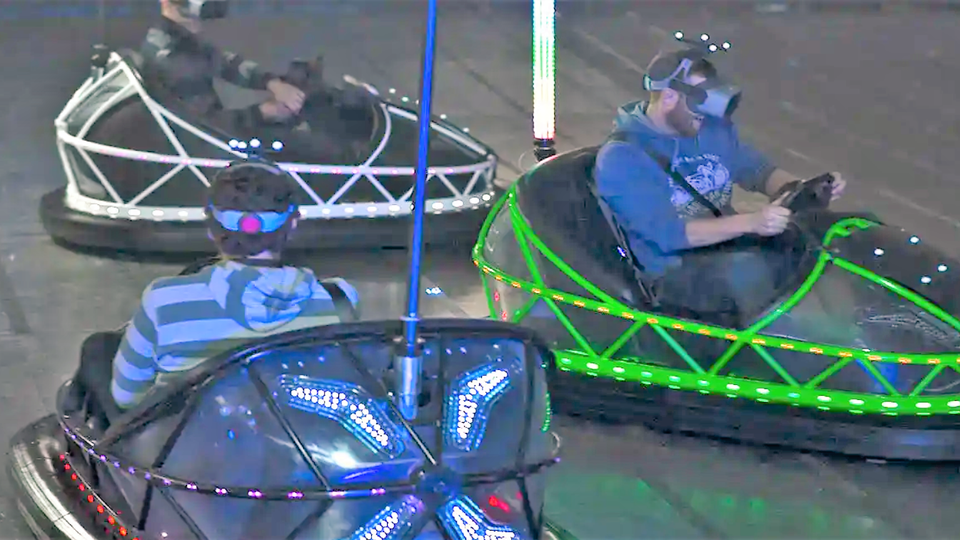Commentary
Consumer and LBE VR: 'the virtual crossover' begins
Development of a means for consumer and commercial players to interact and compete has been a focus since the establishment of home gaming. With the growth in-home VR, new opportunities have arisen.

April 5, 2021 by Kevin Williams
In this time of changing demands, with an audience stuck at home, the need to pivot to offering consumer products while we wait for the amusement and attraction scene to regenerate, is a means to keep revenue coming in for many.
Several leading VR content providers and venue operators have started to invest in what is seen as "the virtual crossover," in the ability to utilize the amassed resources to support consumer VR owners, and also encourage interest in returning to the venues to try the commercial adaptations.
The lack of a serious installed base to support a consumer VR release has started to be answered by the latest generation of VR hardware. There is a great interest in PC VR systems such as Valve's Index, and HP's Reverb G2 — while the mobile VR (standalone) scene has seen an amazing take-up of the Oculus Quest 2 headset after its launch in October. The content download site is run by Valve, and Steam reported in January that half of VR users were downloading their content from the platform on an Oculus piece of hardware.
Oculus steps forward
It is availability to that content which is the latest conundrum. It is all well and good to sell VR hardware, but like any monster it needs to be fed, and available quality VR content is a difficult dish to serve. Oculus, owned by Facebook, has addressed this by launching its own semi-official "AppLab" portal for content.
To date, the jury was out on whether AppLab could be a portal for location based entertainment VR content to be downloaded by operators onto the Oculus For Business approved headsets. Especially considering that, along with the approval process, there is an additional yearly subscription fee for headset operators and content developers.
For developers who do not have the manufacturing capability and want to use the Oculus Quest 2 headset, the need to support the Oculus For Business route is essential and, with that, support of the AppLab platform.
VR developers respond
Developers in LBE who have followed this path include Scale-1 Portal with their support of this route to market for their new "Voxel Arema" platform, along with Pixnami, with the "Hero Zone" platform, and Vietnamese developer Holomia, with its game "MissionX – VR Laser Tag." These are to be followed by others that will dip a toe into the waters of what this content storefront can offer LBE.
VR Nerds offers an example of LBE VR successfully spring boarding to consumer VR recognition and fueling a crossover interactive element. The company is famous for its smash hit "Tower Tag" — the multiplayer VR one-on-one competitive blasting game.
After releasing the tethered enclosure version of the game on the HTC VIVE through a partnership with Sega, the company built on its brand recognition and released a home version. Supporting the Steam storefront, the game was available across the PC VR scene, including the now discontinued Rift-S and Quest.
The company also revealed it is in development of a Quest 2 version, with hopes for a Q2 release.
VR Nerds undertook a unique consumer release, allowing home players to 3D print a version of the weapon from the LBE version of the game to use on their home installation.
Taking the crossover to the next level, VR Nerds has partnered with Spree Interactive to launch a version of the LBE release, exclusive to the "Spree Arena" platform.
The Hologate platform will also be getting its own version of the game.
E-sports enter the fray
Across these platforms it is planned that the e-sports tournaments on the LBE version will be supported by players practicing on the home release.
Regarding Spree's platform, the company has embraced a standalone VR approach rather than using tether or PC backpack, and we have already reported on the deployment of the brand-new Pico Neo 2 VR headset, manufactured by Pico Interactive in partnership with "Spree Arena." Pico is seen by many as an effective LBE solution in standalone VR headsets, having invested in supporting this sector.
Vertigo Games, the VR specialist publishing and development arm of the Koch Media Group, made an announcement of its next major new release which is a perfect example of the cross-platform promotion. Following on from the successful cooperative zombie shooter "Arizona Sunshine," the company revealed "After the Fall" — a fast-paced four-player co-op action to VR, pitting players and their friends against a hostile, evolving post-apocalyptic alternate 1980s L.A. in a fight for survival.
It is highly anticipated that an LBE version of the game is being considered through their newly acquired Springboard VR LBE distribution operation for the spring, following last year's LBE-exclusive release of their title, "Ghost Patrol."
Consider historical precedent
Development of a dedicated means for consumer players and commercial (out-of-home) players to interact and compete has been a focus of investment since home gaming established a market presence. Most notably with the SNK's "NeoGeo" hardware crossover, or Sega's attempts with the "Naomi"/"Dreamcast" VMU system, or Midway with "NFL Blitz 99" and its console tie-in. The ability for the player to be drawn back to the facility after training/playing at home has been a business model that has yet to be fully cultivated.
However, with the growth in-home VR, new opportunities have arisen. This is best illustrated by the recently revealed initiative from VRstudios' new "VRstudios Sports" line, launching with the LBE VR version of "Hoops Madness."
The fast-paced and competitive virtual hoops game is supported with a persistent profile (Player Portal) which players can log on to and be able to create their character and build its skill ranking, and carry on this practice and play via the standalone consumer VR version of the game. This consumer version is available via Steam and VIVEPort content storefronts for the popular home VR platforms.
The team revealed they are putting the finishing touches on an Oculus AppLab version planned to release soon. This approach will see players training on the home version of the VRstudios Sports product to then compete live at the facility, in person, or online from home, across platforms. This will build an e-sports competitive community in support of the platform crossover.
The company is also working on several innovative ideas allowing consumer headsets and devices to be used to virtually spectate at the competitions' immersivity. This would be a first of its kind approach, addressing hygiene and operational issues. VRstudios is planning a major announcement regarding these plans soon.
VR innovation continues
The ability to call upon the skills of creating large VR experiences and then offer them in a consumer-friendly package is a difficult business.
Immotion, known for VR amusement and attraction projects, launched a brand-new division to pivot towards offering "edutainment" — the first release being "Let's Explore Ocean." Called a "Immersive Mega Pack," the customer purchases VR/AR goggles that couple with their smartphone, as well as an informative pack, and unique interface ("Explorer Cube"). After downloading the virtual app, they can explore deep sea habitats, with 11 VR adventures, plus four AR experiences, plus a fun interactive Oceans Quiz — all traversed using the unique cube.
Immotion is employing its experience in creating compelling educational experiences from the work undertaken with "Undersea Explorer — Virtual Reality Theater" installed at the Shark Reef Aquarium part of the Mandalay Bay Resort and Casino. This foray into consumer virtual exploration is building on a new vertical for the traded company.
Another developer with a long list of previous commercial entertainment projects is Felix & Paul — the world renown content studio has been positioning itself across both consumer and commercial endeavors. Recently, the corporation announced the big screen, "The ISS Experience," released in December at Space Center Houston.
From the big screen to the planetarium, "The ISS Experience" has been adapted for the unique needs of this sector, working with the Fiske Planetarium in Colorado to distribute to a network of hundreds of domes around the world. It is this ability to sign distribution deals for much needed content that sees Felix & Paul broaden into the telecommunication services, providing their unique content to both areas, as a promotion of 5G-enabled mobile devices, and also supplied as VR and AR mobile-devices' content — distributing multiple series such as their "Cirque du Soleil" and "Space Explorers."
Another vertical being explored by Felix & Paul is the deployment of their content into edutainment. The company has developed a free-roaming exhibit, in partnership with PHI Studios. This large-scale experience is called "The Infinite," and this multi-disciplinary/multimedia experience includes contemporary art within the virtual experience.
It is the ability to use free-scale VR experience in the art and live performance environment that also saw the Royal Opera House in London partner with developer Figment Productions to create the hyper reality opera experience, "Current, Rising," with a box office opening planned for later in the year.
(Editor's note: Extracts from this blog are from recent coverage in The Stinger Report, published by KWP and its director, Kevin Williams, the leading interactive out-of-home entertainment news service covering the immersive frontier and beyond.)
About Kevin Williams
Along with advisory positions with other entrants into the market he is founder and publisher of the Stinger Report, “a-must-read” e-zine for those working or investing in the amusement, attractions and entertainment industry. He is a prolific writer and provides regular news columns for main trade publications. He also travels the globe as a keynote speaker, moderator and panelist at numerous industry conferences and events. Author of “The Out-of-Home Immersive Entertainment Frontier: Expanding Interactive Boundaries in Leisure Facilities,” the only book on this aspect of the market, with the second edition scheduled for a 2023 release.
 ChatGPT
ChatGPT Grok
Grok Perplexity
Perplexity Claude
Claude






